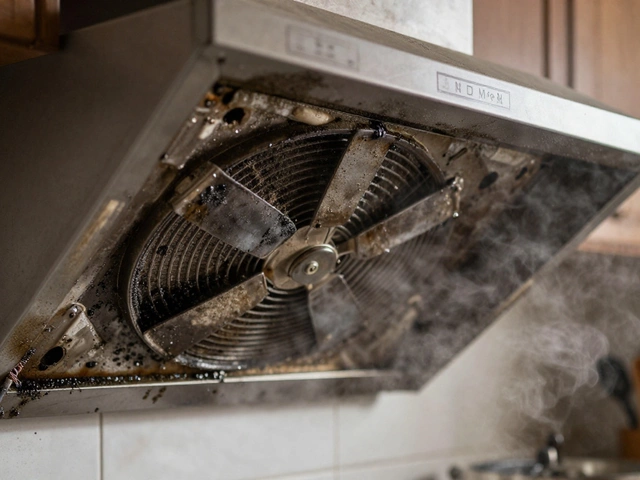If your kitchen or bathroom feels stuffy, or you hear a strange whine every time you turn on the fan, you’re probably dealing with an extractor fan problem. These fans are the unsung heroes that pull steam, odors, and moisture out of rooms, so when they quit working you notice it fast.
Here are the five symptoms that scream something’s wrong:
1. Weak airflow. The fan runs but the suction feels lazy. Dust‑clogged filters, a blocked duct, or a slipping motor belt are the usual suspects.
2. Loud or rattling noise. A wobbling blade, loose mounting screws, or a failing bearing can turn a quiet fan into a miniature jukebox.
3. Fan won’t start. No hum, no spin – either the power supply is broken, the switch is faulty, or the motor has burned out.
4. Buzzing or humming. This often means the motor is trying to work but can’t turn the blade, a sign of a seized motor or a stuck blade.
5. Odd smells. A burnt odor hints at an overheating motor, while a musty smell points to mould growing inside a damp duct.
Before you call a pro, try these quick troubleshooting steps. They take under ten minutes and can save you a call‑out fee.
Power check. Verify the fan is receiving electricity. Use a lamp or a tester on the socket. If the outlet is dead, reset the circuit breaker or replace a blown fuse.
Clean the filters. Most extractor fans have removable metal or charcoal filters. Take them out, soak in warm soapy water, scrub away gunk, dry, and pop them back in.
Inspect the duct. Look for visible blockages—cooking grease, bird nests, or even a fallen piece of insulation. A flexible brush can clear most clogs.
Tighten the mounting. Loose screws let the fan wobble, creating noise and reduced performance. Grab a screwdriver and snug any loose bolts you find.
Test the motor. If the fan spins slowly or not at all, remove the front cover (after turning off the mains). Give the motor a gentle tap with a rubber hammer; sometimes a stuck rotor frees up.
If these steps don’t bring the fan back to life, it’s probably time to replace the unit.
Even the toughest fans have a lifespan—usually 8‑12 years for residential models. Look for these signposts that a new fan is the smarter move:
Replacing a fan typically costs £80‑£150 for a decent unit and basic installation. If you’re handy, you can keep the price toward the lower end by doing the install yourself.
Ready to swap the old fan for a new one? Follow these steps and you’ll have fresh airflow in no time.
1. Gather tools. You’ll need a screwdriver set, pliers, a drill (if new holes are needed), and a ladder or sturdy step stool.
2. Turn off power. Switch off the circuit breaker for the fan circuit. Double‑check with a voltage tester.
3. Remove the old fan. Unscrew the outer grill, disconnect the wiring (note which wire goes where), and unbolt the fan housing from the ceiling or wall.
4. Check the duct. Detach the duct from the old unit. Inspect it for damage; replace if it’s crumbling.
5. Install the new fan. Hang the new housing in place, reconnect the wires to the matching terminals, and secure the unit with the supplied brackets.
6. Seal the duct. Use foil tape to create an airtight connection between the fan and the duct. A leaky duct reduces performance.
7. Test it. Restore power, turn the fan on, and listen. You should feel stronger suction and hear a smoother, quieter spin.
If anything feels off—sparks, strange noises, or no power—switch it off immediately and call a qualified electrician.
Extractor fan problems can often be fixed with a little cleaning and a few checks, but knowing when to replace the unit saves you time and headaches. Keep an eye on airflow, noise, and smell, and don’t hesitate to give the fan a quick DIY overhaul before you call in the pros.

Wondering who fixes extractor fans? Find out which trade has the right skills, top repair tips, and practical advice for solving extractor fan issues fast.

Kitchen extractor fans typically last 10-15 years, but grease buildup and lack of cleaning can cut that in half. Learn the signs it's time to replace yours and how to choose a better model.

Repairing an aging laptop can be a tricky decision. This article explores whether it's still worth investing in a 7-year-old device. We'll consider factors like performance, cost, potential upgrades, and environmental impact. Dive in to learn about the practical and sentimental value of maintaining your trusty laptop.

Looking for the right person to service your boiler? Here’s what you need to know about boiler service, finding qualified engineers, costs, and why it matters in 2025.

Wondering how long it takes to swap out an old boiler for a new one? This article spells out exactly how much time you’ll need, what really affects the timeline, and offers practical tips to speed things up. Get the full breakdown, including what you can do before installation day and how to avoid surprises. If you want your heat and hot water back fast, this guide is for you. Find out what to expect from your boiler replacement and how to stay one step ahead.

Discover when to worry about your boiler, warning signs to watch, and smart tips for safe use. Get practical advice to avoid major boiler headaches.